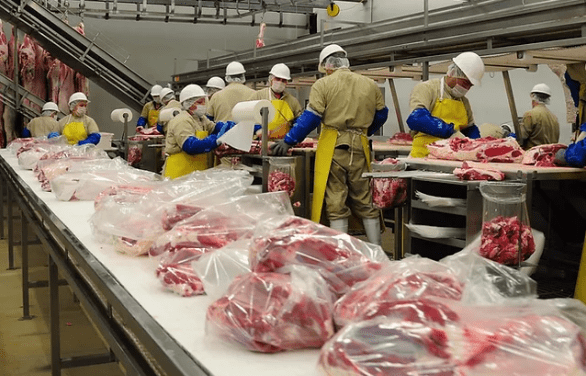The Mexican Ministry of Economy put a project for the modification of the Official Mexican Standard related to the transformation of animal offal for consultation.
The deadline for submitting comments is June 19, 2021.
This is the Modification Project to the Official Mexican Standard NOM-060-ZOO-1999, Zoosanitary Specifications for the transformation of animal offal and its use in animal feed.
For the Ministry of Economy, the objective is to update the technical specifications and procedures for the transformation, collection, as well as the use of animal offal destined for animal feed, including its import, storage, distribution, sale and use.
As stakeholders they are:
- National Service for Agrifood Health, Safety and Quality (SENASICA).
- National Association of Establishments TIF, A.C. (ANETIF).
- National Council of Manufacturers of Balanced Foods and Animal Nutrition, A.C. (CONAFAB).
- National Association of Food Manufacturers for Animal Consumption, S.C. (ANFACA).
- Mexican Association of Recycling Plants of By-products of animal origin, A.C. (AMEXPRESS).
- Mexican Association of Food Producers, A.C. (AMEPA).
- Mexican Meat Council (COMECARNE).
Animal offal
The Standard is mandatory throughout the national territory and aims to establish the specifications to regulate the use and transformation of animal offal and by-products, as well as the commercialization of animal meal and its use in feeding them, for prevent this process from becoming an animal health risk with respect to transmissible spongiform encephalopathies.
They are subject to regulation by this Standard, the individuals and legal entities responsible for the establishments where tissues of animal origin are benefited or rendered, the slaughter, cutting and process plants that produce offal, whether or not they have their own processing plant. benefit, those who market meat, bone or mixed meals, whether of national or imported origin, as well as those dedicated to the manufacture and marketing of food products for animals, whether commercial or for self-consumption.
Fat, processed tallow, milk protein, gelatin, fish and feather meals are not a reason for regulation by this Standard; as well as blood and its elements obtained from animals
Context
The foregoing is relevant because NOM-060-ZOO-1999 since its issuance has not had changes that update its content; therefore, it is necessary to adjust it according to the new research carried out regarding Transmissible Spongiform Encephalopathies (TSE).
Under these considerations, the regulatory proposal aims to achieve the following specific objectives:
- Harmonize NOM-060-ZOO-1999 with the provisions of the LFSA and its Regulations.
- Minimize the probability of entry into the country of merchandise that is material of risk and that could generate significant damage to animal health.
- Speed up the identification of the importation of risk material, in order to avoid its spread in the feeding of ruminants.
- Strengthen health regulations related to TSEs, so that meat products of Mexican origin generate more confidence and greater certainty, both for national and international consumers, which will have a positive impact on the commercial exchange of our country.
- Guarantee the safety and correct use of products for animal consumption, so that ruminants are not fed with those products of ruminant origin identified as specific risk materials.
- Improve production processes, in order to reduce the probability of cross-contamination of flours of ruminant origin with non-ruminant ones. • It will reduce the possible potential risks that impact on animal health, to avoid economic losses in the national livestock and that there are public health problems.
- Annually renew the negligible risk status of Bovine Spongiform Encephalopathy (BSE) in Mexico before the World Organization for Animal Health (OIE).
Risks on animal offal
Under these considerations, the preliminary regulatory project seeks to improve the measures established by SADER to prevent TSEs from entering Mexico and therefore avoid negative consequences on national livestock and on the consumption of contaminated meat by the population.
The Expert Committee of the World Health Organization (WHO Committee) defines zoonoses as those diseases and infections that are transmitted between animals and man, either by direct contact with a sick animal, by intermediate agents ( mosquitoes or other insects) or by eating contaminated food of animal origin.
Likewise, the Pan American Health Organization (PAHO) mentions that the increase in the spread of zoonoses is due to: increased commercial activity; as well as for the mobilization of people, animals, their products and by-products; modernization of agricultural practices; the destruction of the habitat of the species by human invasion and climate change.
Consequently, PAHO indicates that among its negative effects are:
1) The impact on livestock and fishing derived from the deaths of infected animals, in addition to those slaughtered to prevent the spread of diseases.
2) Foreign trade restrictions imposed on countries to prevent the spread of diseases.
3) The important expenditures in health services, derived from the high rates of morbidity and mortality in human beings.
Authority
Ministry of Economy.
General Directorate of Standards.
Pachuca Street number 189, floors 7, and 12, Colonia Condesa.
Cuauhtémoc Territorial Demarcation.
Postal Code 06140 – Mexico City.
Tel: + (52 55) 5729 9100, extension 13217/13264.
Emails:
Lic. César Osvaldo Orozco Arce cesar.orozco@economia.gob.mx
Lic. Tania Daniela Fosado Soriano tania.fosado@economia.gob.mx
![]()

